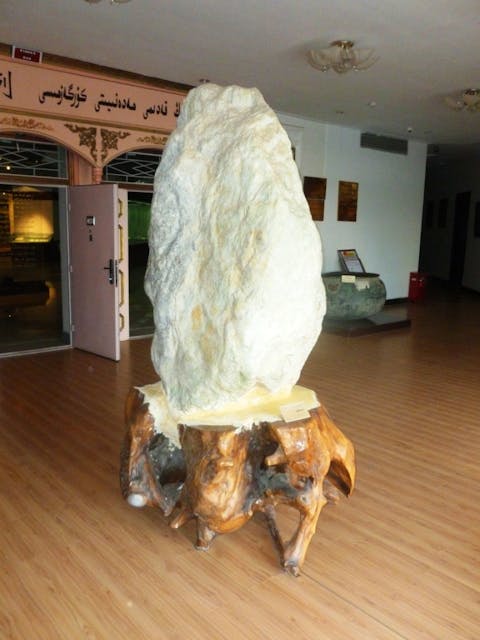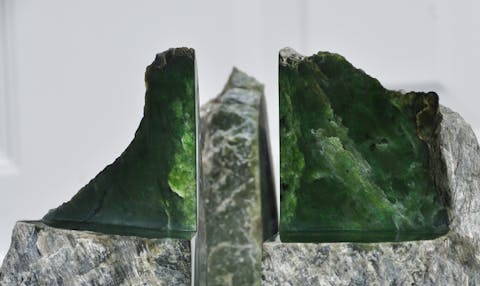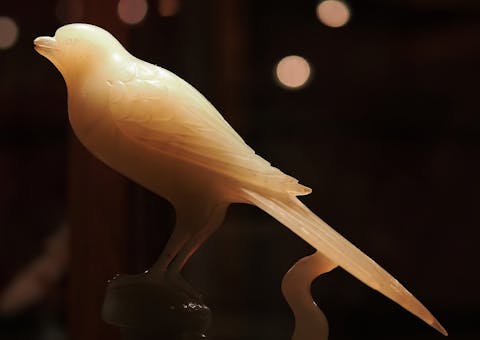How to Appraise Jade
With its distinctly unique quality of beauty and allure, it is easy to understand why jade has been seen as a status symbol of wealth for several centuries. It's one of the world's most highly coveted semi-precious stones since ancient times. Read more and find out how much jade is worth. And also – if you, by any chance, own jade, Value My Stuff will gladly assist you in appraising your jade stones.
Jade stone figure of bear holding fish. Image: Public Domain
For thousands of years, people have admired jade for its richness in color and decorative nature, qualities that resulted in the stone being associated with royalty, luxury, and beauty. Today people worldwide continue to enjoy what this gorgeous stone has to offer, whether in terms of its natural form, jewelry, decoration, ceremonial relevance, or more. Would you like to know more about how much your jade is worth in today's market? First, we have to answer a question: What is jade?
Jade or Jadeite?
The name jade refers to two different silicate minerals: nephrite and jadeite. While the two look quite the same in terms of texture and color, they differ in properties. For example, nephrite can be found in creamy white shades as well as a variety of light green colors. It is also a much softer mineral and much more common in nature. Jadeite, however, offers more color variations, is much more complex, and has a build similar to a crystal which often adds to its transparency. Jadeite is rare and has been recorded in fewer than twelve places worldwide.
How To Determine Jade Value
There are some essential factors that you need to look at, more precisely: color, transparency, texture cut, size, and weight. However, the best way to get an accurate value for your Jade stones is to seek expert guidance. That's something we at Value My Stuff are more than happy to help out with. Follow these simple steps to appraise your jade stones today.
What is the most expensive piece of Jade?
According to an ancient Chinese proverb, "黄金有价,玉无价" ("gold has a value, jade is invaluable"), it is easier to put a value on the gold than establish the value of jade because it often exceeds the worth of the stone. While there are many technical parameters that have to be taken into account while putting a price tag on a jade item, such as mineral composition, size, or purity, one of the most important aspects is also the design and the context in which the object was used. The purpose can affect the value so much that a small jade item can be much more expensive than a larger-scale jade sculpture. For example, one of the most costly ancient items made of jade is a Neolithic vessel called jade cong with sacred human and animal faces from Liangzhu culture. The circular vessel is just 8.4 cm in diameter and sold for roughly $230 000 in 2018. The most expensive piece of jade jewelry is already the iconic jade necklace of Barbara Hutton, which sold for a record-breaking 27.44 million dollars at Sotheby's Hong Kong in 2018 to the Cartier Collection.

Large piece of nephrite jade in light milky green shade displayed in Hotan Cultural Museum's lobby. Image: John Hill / Lincense : CC BY-SA 3.0

A piece of jadeite jade displayed in Jade City, British Columbia, Canada, Image: Public Domain
Jade Stones and Their Colors
The first aspect to take notice of regarding the value of a piece of jade is its color. Contrary to what many may believe, jade can be found in various shades of green and forms in colors such as lavender, orange, red, yellow, black, and white. Jade in specific colors is more sought after and thus more worthy than others. Because of this highly decisive factor in the valuing of this type of jade stone, some will treat or bleach jade in order to obscure and remove the evidence of discoloration before instilling it with colored polymers; these artificially altered jadeites are not nearly as valuable as their untreated counterparts.
Lavender Jade
The second most expensive jade stone exhibits a lavender hue. Lavender jade will be worth more than other types of non-Imperial green jade, such as those with a more blue or yellow tint. The more untainted and uninterrupted by impurities your jade stone is, the more valuable it will be. Though jade that bears streaks and veins of contrasting colors may appear attractive and thus bring in some buyer interest in that regard, it will never stand up to the value that a more uniform jadeite will attract.

Antique bird figure made of white jade stone. Image: Public Domain
White Jade
White jade stone was regarded as ancient China's most precious and valuable stone. Its value was equivalent to how the West values diamonds and gold. It was highly prized for its beauty and durability; it symbolized purity, moral integrity, and indestructibility. It was often used to make so-called burial jade suits for the country's wealthiest and most essential personas. Today we know that white or creamy nephrite is much more common and less valuable than white jadeite, a scarce stone that can still be prized more than gold in Asian countries.
Antique Jade Jewelry
Jewelry with jade stones goes back thousands of years. It's, therefore, somewhat common to see jade jewelry at auctions and such. This includes everything from necklaces to rings and belts to bracelets. For a trained eye, it's easy to see if it's an authentic antique jade stone or if it's a newly produced stone with the purpose that it shall look old. The best way is always to have an expert look at the jewelry. At Value My Stuff, we offer such a service and provide appraisal certificates within 24 or 48 hours. Follow these easy steps to appraise your jade stones.
Translucency and Texture of Jade
The value of jade also depends on its transparency and texture. Jade stone varies in its clarity, coming in forms that range from entirely opaque to almost completely translucent. Because those opaque stones do not hold any light and thus appear dull, semi-transparent jade stones will be worth much more. In fact, these types of jade can reach high prices even despite unevenness in tone and color. Usually, the finer and smoother the texture of the stone, the more translucent it will appear as opposed to those jade stones with a more rugged surface, and thus the relationship between texture to value follows this correlation.
Related: The Meaning of Jade
The Perfect Cut For Jade
Oftentimes, jade is cut into cabochons for use in jewelry or other accessories, meaning it's polished but not faceted. In these cases, the jade stones are more valuable when thick, symmetrical, and proportional; there ought not to be any flaws or imperfections to the surface of a jade stone visible to the naked eye, and some shapes ought to be uniform with no flat spots or unevenness. Other times, jade can be cut into round beads, which are matched to others of a similar color hue and intensity to be strung together. Because of the difficulty in finding jade beads of matching color, long strands with larger beads can be extremely expensive. Another precious cut of jade is bracelets or bangles that have been cut from a single piece of stone.
Check The Latest Jade Auctions at Barnebys Here!
What Color of Jade is Most Valuable?
TIt's difficult to appraise jade stones only by the color as there are some other factors, such as color intensity, quality, and rarity, that one needs to take into account, but in general, the value per carat is as follows:
$500 to $10,000 per carat – Imperial Green Jade
$200 to $3,000 per carat – Lavender Jade
$100 to $2,000 per carat – Apple Green Jade
$50 to $500 per carat – White Jade
$50 to $800 per carat – Yellow Jade
$100 to $1,500 per carat – Black Jade
$100 to $1,500 per carat – Blue Jade
$200 to $3,000 per carat – Purple Jade
How To Get Jade Appraised
Whether it is a modern jade sculpture or a piece of antique jade jewelry, it is always good to get a professional appraisal of your pieces because it is the most important step in ascertaining the jade stone value. Only a professional will be able to provide you with a sure and particular range of value and an up-to-date price of your jade stone by using their experience and expertise to eliminate as much chance for misstep and error as possible. Luckily here at Value My Stuff, there are experts in the field who can provide professional appraisal and valuation services so that you can take the necessary steps to discover how much your jade stone is worth today! Start Your Jade Stone Appraisal Here!

